Transportation Secretary Pete Buttigieg called on railway company Norfolk Southern on Sunday to support more industry regulations aimed at improving safety standards amid growing concerns about the environmental impacts of the company’s train derailment in East Palestine, Ohio.
“Norfolk Southern and your industry must demonstrate that you will not seek to supercharge profits by resisting higher standards that could benefit the safety of workers and the safety of American communities,” Buttigieg wrote in a letter to Norfolk Southern President and CEO Alan Shaw of stalled Obama-era regulations for railway companies.
“This is the right time for Norfolk Southern to take a leadership position within the rail industry, shifting to a posture that focuses on supporting, not thwarting, efforts to raise the standard of U.S. rail safety regulation.”
In the letter, the secretary also he would also be calling on Congress to increase the $225,455 cap on fines for breaches of railway safety laws, as well as announcing several steps to “immediately improve rail safety for workers and communities.”
Buttigieg has been facing mounting criticism from local officials, East Palestine residents, and lawmakers on both sides of the aisle over his handling of the Feb. 3 derailment.
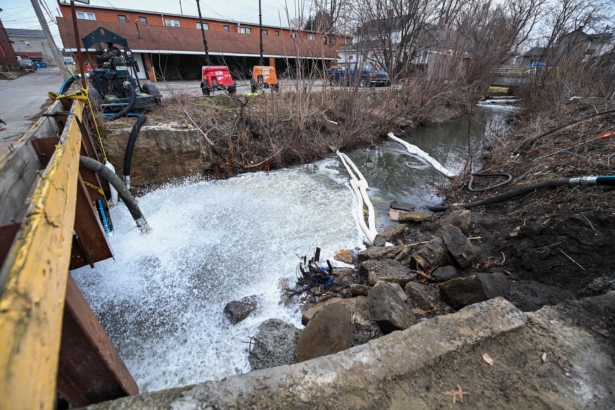
Thousands of residents were evacuated on Feb. 6 for five days as fumes and smoke filled the air from an initial fire followed by controlled burns of vinyl chloride in five train carriages. A joint decision was made by Norfolk Southern and regulators to release the chemicals to prevent a catastrophic explosion of shrapnel as the carriage pressure relief devices had stopped working.
According to the National Transportation Safety Board, 38 cars of the 150-car train derailed. Out of 20 cars carrying hazardous or potentially hazardous chemicals, 11 derailed. Five of these held vinyl chloride—a known carcinogen—and others held hazardous ethylene glycol monobutyl ether, ethylhexyl acrylate, isobutylene, and butyl acrylate—all products used in the making of plastic products.
Initial investigations suggest an overheated wheel bearing was the cause of the accident.
Soon after the crash, emergency response crews reported chemical contamination in two local streams—Sulphur Run and Leslie Run—prompting the installation of booms and underflow dams to contain the flow of contaminated water.
A chemical plume of butyl acrylate was also detected in the Ohio River, although it has since dissipated, according to the OHIO EPA, which did testing for both butyl acrylate and vinyl chloride.
The Ohio Department of Natural Resources estimated that about 3,500 fish died from leaked chemicals in the impacted waterways, and that butyl acrylate, which is used to make polymers and resins, was the primary toxin responsible.
East Palestine Mayor Trent Conaway announced a state of emergency. Around 4,700 people live in the town, which borders Pennsylvania.
Health Concerns
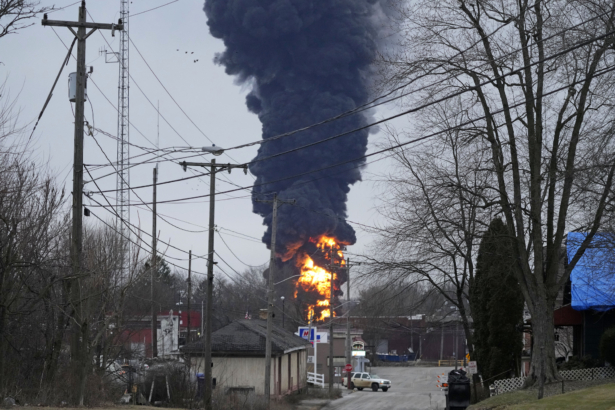
Some residents have since reported health issues that they worry are linked to the chemical spill and blaze, sparking concerns about the health and environmental impacts of the derailment. However, the EPA said tests of air and water found low amounts of hazardous chemicals beyond the immediate spill zone along Sulfur Run.
“The level of concern for this contaminant is 560 parts per billion, and readings yesterday were under 3 parts per billion. Water testing on the Ohio River is no longer detecting the presence of butyl acrylate or any other contaminant associated with the derailment,” Gov. Mike DeWine said on Feb. 17.
He added that the air inside more than 500 homes had been tested for phosgene and hydrogen chloride, the byproducts of vinyl chloride combustion, and no concerning readings were found inside or on the streets.
The EPA has also been monitoring for other chemicals known to be on the train and their combustion byproducts.
Chemical contamination is still visible in the section of Sulfur Run adjacent to the crash site, with authorities asking people to avoid the area. Video showing contaminants in the water are from Sulfur Run.
“A section of Sulphur Run, which is very near the crash site … remains severely contaminated,” DeWine explained. “We know this. It will be remediated.”
Sulfur Run flows into Leslie Run then North Fork Little Beaver Creek, Little Beaver Creek, and then the Ohio River.
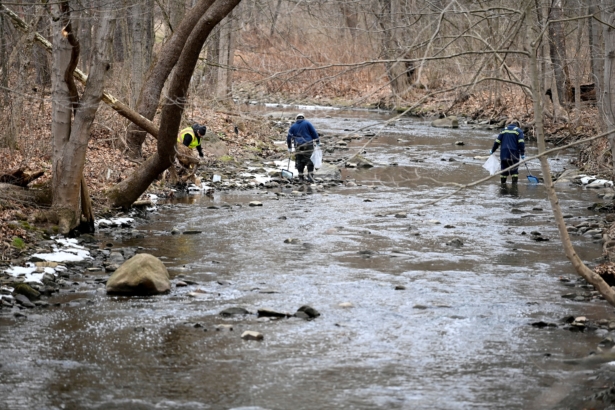
Residents are seeking reassurance amid the uncertainty of the impact following the environmental disaster.
DeWine said that the U.S. Department of Health and Human Services (HHS) has agreed to set up medical clinics “to engage with residents” who have health concerns next week. A toxicologist is also on call to answer questions on 800-222-1222.
“We know that the science says that East Palestine is safe, but we also know that residents are very worried.
“They are asking themselves ‘Is my headache just a headache? Or is it a result of the chemical spill? Are other medical symptoms caused by the spill?’ Those are very legitimate questions and residents deserve answers,” he said.
Buttigieg had waited 10 days to address the derailment, at which time he tried to explain that his department had been among the first responders to the incident. Among high-level federal officials, only EPA head Stanley Regan has paid a visit to the spill site.
In his letter, Buttigieg said “it is clear that area residents are not satisfied with the information, presence, and support they are getting from Norfolk Southern in the aftermath and recovery. It is imperative that your company be unambiguous and forthright in its commitment to take care of the residents—now and in the future.”
Buttigieg also made a point to criticize the company for spending millions lobbying lawmakers to oppose additional government-proposed regulations for the industry. Such regulations include forcing trains to install controversial new electronic braking systems and minimum crew size requirements.
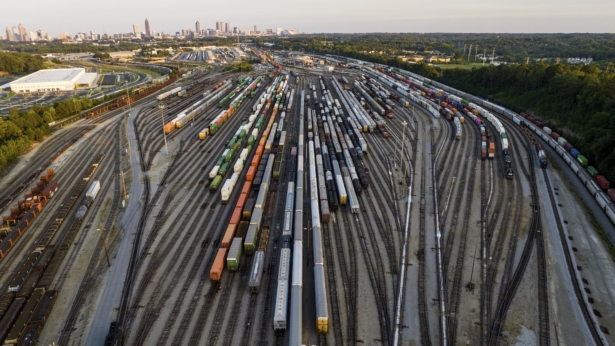
“The people of East Palestine cannot be forgotten, nor can their pain be simply considered the cost of doing business. Norfolk Southern must live up to its commitment to make residents whole—and must also live up to its obligation to do whatever it takes to stop putting communities such as East Palestine at risk,” he wrote.
The Epoch Times has contacted Norfolk Southern for comment.
But he did acknowledge Shaw’s promise to the East Palestine community that Norfolk Southern will help them recover from the crash.
Norfolk Southern’s Response
CEO Shaw met with residents for a second time on Feb. 18.
“In every conversation today, I shared how deeply sorry I am this happened to their home. We are going to do the right things to help East Palestine recover and thrive again,” he said.
Norfolk Southern has responded in various ways to the emergency and health concerns of the community, including by supplying bottled water for returned residents at its Family Assistance Center, which it set up in the neighboring town of New Waterford about 4 miles away.
Earlier last week, the company also announced a $1 million “Community Giving Fund” to be managed by town residents. It has also distributed more than $1.7 million in direct financial assistance so far to more than 1,100 families and businesses in East Palestine for evacuation costs like lodging, travel, food, and clothes. The family assistance center is processing claims for evacuated residents and can be contacted at 1-800-230-7049.
“We are committed to East Palestine today and in the future,” Shaw said when announcing the fund.
The company also reimbursed the city fire department $220,000 for the costs of their Self-Contained Breathing Apparatus (SCBA) air packs, which allow firefighters to breathe when responding to fires. More than 100 air purifiers have also been supplied to homes immediately around the crash site.
Darrell Wilson, assistant vice president of government relations for Norfolk Southern, said that the company is “committed to be with that community to get it right” after the “extraordinary” accident, noting that the company understands and expects legal claims for damages that will play out over time.
“For the process of damages and legal claims, that’s going to play out over a longer period of time, but we’re not going anywhere,” he said.
Immediately after the derailment, the company also contributed $25,000 to the Red Cross to provide rapid assistance during the immediate aftermath of the explosion. “We anticipate making further charitable contributions in East Palestine as conversations continue with local leaders and members of the community,” Wilson added.
The company has promised to cover all the costs related to the evacuation and cleanup of toxic chemicals from the accident.
According to DeWine, 8,350 cubic yards of contaminated soil and 1.1 million gallons of contaminants and contaminated liquid have so far been removed from the site immediately adjacent to the derailment.
DeWine said Norfolk Southern “should continue to pay and we’re going to insist that they pay whatever damages have been caused. The railroad is responsible for those damages.”
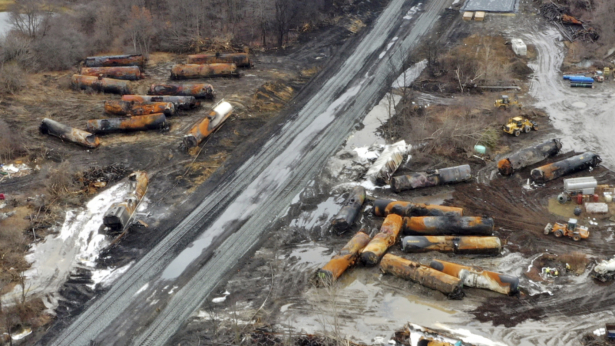
The EPA, which is in touch with responding groups, said in an update on Sunday that Norfolk Southern is currently focused on scrapping and removing rail cars at the derailment location, and working to excavate contaminated areas, including removing contaminated liquids from affected storm drains.
The agency said that water continues to be diverted as responders work to decontaminate the derailment site along a section of Sulphur Run.
The EPA said on Sunday that responders are prioritizing the removal of heavily contaminated soil in the derailment area, after which it expects that odors will subside in the community.
Monitoring of Groundwater Needed
According to a FAQ document from Norfolk Southern, the company said it did not believe that contamination in East Palestine’s surface waters would affect the town’s drinking water.
“The East Palestine water supply comes from a series of groundwater wells,” it said. “Due to the location of the derailment, it is improbable that substances from the derailment have impacted or will impact the groundwater or drinking water wells in the area.”
The Ohio EPA also said that the town’s main water supply was protected from immediate threats from the leaked chemicals. However, it said that possible chemical leaching into groundwater supplies is still being investigated.
“This is something we will look at—how deep is the contamination,” Ohio EPA’s Kurt Kollar said. “Not just horizontal, but depth, so that we can make sound decisions based on the information gathered during the investigation.”
He added that any homes concerned about their private drinking wells can call the 330-849-3919 hotline to have their water tested for contaminants.
For those seeking mental health support, you can call the Ohio Careline at 1-800-720-9616.
From The Epoch Times


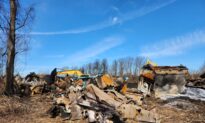 Biden Administration Facing Criticism for Ohio Toxic Train Derailment Response
Biden Administration Facing Criticism for Ohio Toxic Train Derailment Response